新概念第二册lesson20
新概念英语第二册第二十课课后习题答案详解 Lesson

新概念英语第二册第二十课课后习题答案详解Lesson 201. b根据课文第4行 I never catch anything---not even old boots, 只有 b. nevercatches anything 与课文实际内容相同,而其他3个选择都与课文内容不符。
根据课文最后一句I am only interested in sitting in a boat and doing nothingat all! 只有c. doing nothing 是正确答案,而其他3个选择都不符合课文内容。
本句是对主语提问的,回答是. who (谁)是对主语提问的;c. whom(谁)是对宾语提问的;d. whose(谁的)确是对定语提问的;只有b. which 是对做主语的事物提问的,所以选b.本句是带never的否定句,只有b. anything 可以用在否定句中。
而a. nothing若用在否定句中,就会使原句变成肯定意义的句子,不符合题目意思;c. something 只能用于肯定句中;d. everything 也不能用在否定句中。
前面句子 I am even less lucky 中的 less(不及)是表示否定意义的比较级,只有c. not so是表示否定意义的,而其他3个选择都没有否定的意思.只有b. an empty bag 最符合语法。
而其他3个选择都有语法错误。
a. a empty bag 中empty是以元音开头的,前面不能用a 而应该用an; c. empty bag 中 bag 是可数名词,需要用an 来修饰;d. oneempty bag 不符合习惯用法,单数可数名词前通常用不定冠词a 或an 修饰,除非表示强调才用one 修饰。
因此应该选b.只有c. all 才能使这个句子同前一句I am only interested in doingnothing.的含义相符合,all等于the things that ,可以代替doing nothing. 而其他3个选择中a. only 和d. the only 不符合语法,b. the one 不符合题目意思,不能完全表达清楚。
新概念第二册lesson20
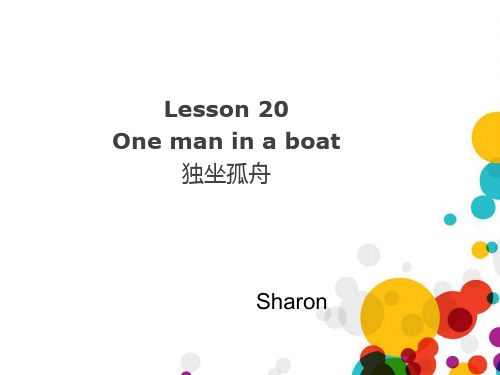
• catch fisherman boot waste realize
v. n. n. n. v.
抓到 钓鱼人, 渔民 靴子 浪费 意识到
【New words and expressions】 ★ catch v. 抓到 (caught;caught)
The early bird catches the worm. 捷足先登。 catch fish/ a thief catch a cold:染上感冒---have a cold catch the bus:赶车-----miss the bus 错过车 catch one’s attention/ eyes吸引某人注意力 catch fire:着火(动作)
★ boot n. 靴子
a pair of boots running shoes 跑鞋 tennis shoes 网球鞋 leather shoes 皮鞋 sandles 凉鞋 sneakers 轻便运动鞋 (Am.) slipper 拖鞋
★ waste vt./n. 浪费 waste 1) vt.浪费
Answer the questions: 1.What is the writer’s favourite sport? 2.What do some unlucky fishermen catch? 3.Is the writer as lucky as they are, or is he not so lucky? 4.Does he ever catch anything? 5.Is he really interested in fishing? 6.What is the only thing that interests him?
It is a means of relaxation. He enjoys the peace of mind.
新概念英语第二册课件Lesson20(共29页)

【Key structures】关键句型
• spend+时间+在某地 在某地度过……时间 • I spent a whole day in the room, but I
didn’t write a single word.
• after <conj.>+从句 在……之后 • After <prep.>+ doing 在…..之后 • After I went to school, I learned a lot of
★realize v. 意识到
• ① v. 认识,知道,明白,意识到 • I went into the wrong room without
realizing it. • ② v. 实现(希望、目标、愿望等) • realize one's dream 实现某人的梦想 • ③ 使变为事实,使发生(常用于被动语态) • This plan can never be realized.
• I was worried about my brother for he caught a serious cold.
• Instead of catching fish, they catch old boots and rubbish.
• instead of… 而不是… 可以放于句首或句尾 • I went to school instead of staying at home. • She bought a book for me instead of buying a dress.
新概念英语第二册20课

●LESSON 201.生词与短语1)catch表示捉到的时候,还可以用:grab,seize,hold,take hold of等等Catch fish 钓鱼,捕鱼Catch thief 抓住小偷Catch the bus 赶公共汽车→miss the bus 错过公共汽车catch one’s attention Catch one’s eyesdraw one’s attention Draw one’s eyes }吸引某人注意力attract one’s attention Attract one’s eyescatch fire 燃烧,着火(强调动作)be on fire 燃烧着的,着火的(强调状态)Catch a cold 患感冒(强调动作)Have a cold 患感冒(强调状态)Catch sb. doing sth 抓住某人正在做某事Eg. The little boy was caught stealing apples from the garden.这个小男孩正在偷苹果被.抓住了。
Eg. The early bird catches the worms. 早起的鸟儿能捕到虫子。
(谚语的实际含义:捷足先登)【同义词区分】grab 抓起,抢夺,热切或拼命地抓snatch 抢夺,突然而迅速地抓起arrest (依法)逮捕capture 俘虏,捕获trap 设陷阱捕捉grasp 握紧,抓住seize 握紧,抓住catch it 被责骂,受处罚【口】(常与will等连用)Eg. If I come home late , I’ll catch it from my mother. 如果我回家晚了,妈妈会骂我的。
catch up with 赶上(某人)eg. Go ahead , please. I’ll soon catch up with you.Catch on (意见,时尚)受欢迎的Catch phrase 标语,引人注目的句子2)fishFish →fishman (pl. fishmen)Fish 鱼(c.)n..⑴fish 鱼(pl.)单复数头同形⑵fish 不同种类的鱼A big fish in a small pond. 一个小池塘里的大鱼(中文寓意:山中无老虎,猴子称霸王)Eg. When the cat is away, the mice will play.当猫不在的时候,老鼠就开始玩儿了。
新概念第二册第20课

费 • eg. It’s a waste of time.
• eg. It’s a waste of money.
第十三页,共44页。
• realize • v. 意识到(无被动,无进行,人做主
eg. When the cat is away, the mice will play. 老猫不在家老鼠(lǎo shǔ)笑呵呵。 teach fish to swim 班门弄斧 drink like a fish 牛饮 like a fish out of water 如鱼离水
第九页,共44页。
第十九页,共44页。
fish hook
第二十页,共44页。
fishing line
第二十一页,共44页。
fishing net
第二十二页,共44页。
FISH
Fish begins to stink at the head. 〔谚语〕 上梁不正下梁歪,鱼要腐烂头先坏。 It is a silly fish, that is caught twice with the same bait.
• boot n. 靴子 • A pair of boots • have one’s heart in one’ boots • 极为(jíwéi)悲观消沉 • have one’s heart in one’s mouth • 极为(jíwéi)恐惧
第十一页,共44页。
boots 长筒靴 rubber boots 橡胶长靴 running shoes 跑鞋 platform shoes 厚跟鞋 leather shoes 皮鞋 sandal ['sæ ndl] n.凉鞋 sneaker ['sni:kə] n.(帆布胶底)运动鞋 (Am.) slipper 拖鞋 moccasin ['mɔkəsɪn] n.(原为北美印第安人穿 的无后(wú hòu)跟)软皮平底鞋,莫卡辛鞋 tennis shoes 网球鞋 loafer 平底便鞋
新概念第二册ppt课件

After having spent whole mornings on the river, I always go home with an empty bag. after(conj.)+从句,从句主语必须是主句的主语才能换成下面 一种形式 after(prep.)+名词/动词的ing形式 After I go to school,I learned a lot of knowledge. After going to school,I learned a lot of knowledge. After the students handed in their papers, the teacher left.
Fishing is the writer’s favourite sport. Some unlucky fishermen catch old boots and rubbish. The writer is not so lucky. He never catches anything. He is not really interested in fishing. Sitting in a boat and doing nothing at all is the only thing that interests him.
2)v.+ing形式; 3) 它在句中其名词的作用,可单独或引起短语作主语,表语,
动词宾语,或介词的宾语以及定语。)
Subject
Instead of catching fish, they catch old boots and rubbish.
instead of 不做…而做… (可置于句首或句尾) without强调没有做某件事,instead of强调这件事没做成而做
新概念第二册lesson20课件

而在It’s important … / It’s necessary … / It’s advisable … / It’s essential … / It’s fitting … 这类句型中,只能用不定式,如: It’s important to learn foreign languages. It’s quite necessary to read it many times.
Subject
1) V-ing 形式作主语 往往表示抽象、笼 统的动作或泛指某动作或行为。如: a.) Getting up early is a good habit. b.) Fishing is Tom’s favorite hobby. c.) Crying over spilt milk is no use. d.)Arguing with him is a waste of time.
注①:动名词作表语与不定式作表语的区别:
动名词作表语时表示比较抽象的一般行为、习惯;不
定式作表语时表示具体的某一次动作,特别是将来的动作,
试比较:
My favourite sport is swimming.
The first thing for us to do is to improve our
Predictive
2) V-ing形式作表语 (放在系动词之后,泛指 某种动作或行为,常用来说明主语的身份、内 容或特点。)如:
a.) My job is testing all kinds of software. b.) The purpose of my letter is advising you to do more sports. c.) His greatest happiness is serving the people. d.) Seeing is believing.
新概念英语第二册第二十课课后习题答案详解 Lesson 20教学内容

新概念英语第二册第二十课课后习题答案详解Lesson 201. b根据课文第4行 I never catch anything---not even old boots, 只有 b. nevercatches anything 与课文实际内容相同,而其他3个选择都与课文内容不符。
2.c根据课文最后一句I am only interested in sitting in a boat and doing nothingat all! 只有c. doing nothing 是正确答案,而其他3个选择都不符合课文内容。
3.b 本句是对主语提问的,回答是Fishing.a. who (谁)是对主语提问的;c. whom(谁)是对宾语提问的;d. whose(谁的)确是对定语提问的;只有b. which 是对做主语的事物提问的,所以选b.4.b本句是带never的否定句,只有b. anything 可以用在否定句中。
而a. nothing若用在否定句中,就会使原句变成肯定意义的句子,不符合题目意思;c. something 只能用于肯定句中;d. everything也不能用在否定句中。
5.c前面句子 I am even less lucky 中的 less(不及)是表示否定意义的比较级,只有c. not so是表示否定意义的,而其他3个选择都没有否定的意思.6.b只有b. an empty bag 最符合语法。
而其他3个选择都有语法错误。
a. a empty bag 中empty是以元音开头的,前面不能用a 而应该用an; c. empty bag 中 bag 是可数名词,需要用an 来修饰; d. oneempty bag 不符合习惯用法,单数可数名词前通常用不定冠词a 或an 修饰,除非表示强调才用one 修饰。
因此应该选b.7.c只有c. all 才能使这个句子同前一句I am only interested in doingnothing.的含义相符合,all等于the things that ,可以代替doing nothing. 而其他3个选择中a. only 和d. the only 不符合语法,b. the one 不符合题目意思,不能完全表达清楚。
(完整版)新概念二Lesson20练习题
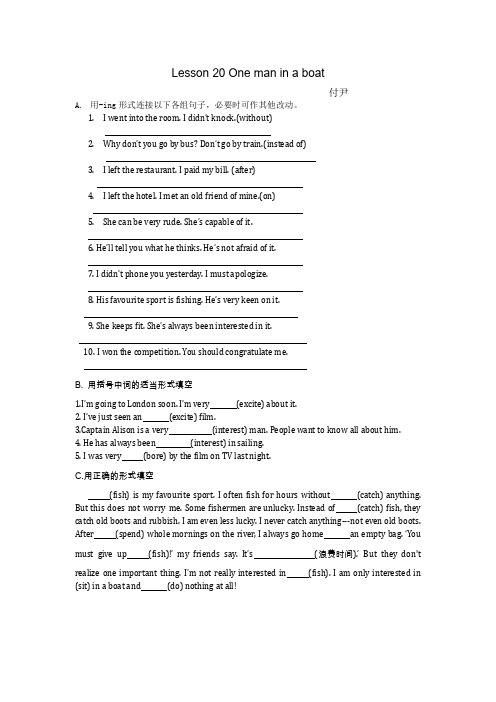
Lesson 20 One man in a boat付尹A.用-ing形式连接以下各组句子,必要时可作其他改动。
1. I went into the room. I didn’t knock.(without)2. Why don’t you go by bus? Don’t go by train.(instead of)3. I left the restaurant. I paid my bill. (after)4. I left the hotel. I met an old friend of mine.(on)5. She can be very rude. She’s capable of it.6. He’ll tell you what he thinks. He’s not afraid of it.7. I didn’t phone you yesterday. I must apologize.8. His favourite sport is fishing. He’s very keen on it.9. She keeps fit. She’s always been interested in it.10. I won the competition. You should congratulate me.B. 用括号中词的适当形式填空1.I’m going to London soon. I’m very(excite) about it.2. I’ve just seen an(excite) film.3.Captain Alison is a very (interest) man. People want to know all about him.4. He has always been (interest) in sailing.5. I was very (bore) by the film on TV last night.C.用正确的形式填空(fish) is my favourite sport. I often fish for hours without (catch) anything. But this does not worry me. Some fishermen are unlucky. Instead of (catch) fish, they catch old boots and rubbish. I am even less lucky. I never catch anything---not even old boots. After (spend) whole mornings on the river, I always go home an empty bag. ‘Youmust give up (fish)!’ my friends say. It’s(浪费时间).’ But they don'trealize one important thing. I’m not really interested in(fish). I am only interested in (sit) in a boat and (do) nothing at all!D. 汉译英1.看电视是我最喜爱的业余爱好。
新概念第二册第20课 Lesson20
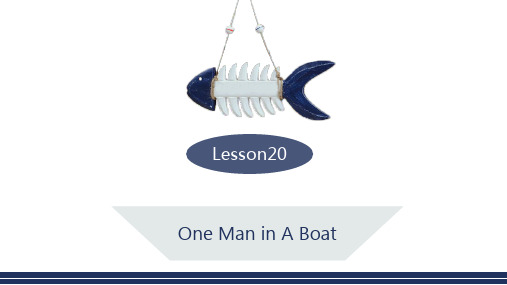
It is a more useful book than that one. .
He is more careful than his sister .
That church is the oldest building in the city .
Yesterday was the hottest day of the year .
some
【甘肃.定西】( ) 3. The boy is looking forward to exam. A. to have B. has C. having D. have
a good time after the
能加名词就是介词
【湖北·孝感】28 Jack took an interest in
非谓语动词作主语 To learn languages is my hobby Learning languages is my hobby 钓鱼是我最喜爱的运动 (fish) 看电视是浪费时间(watch TV) Fishing is my favorite sport To watch TV is a waste of time
English well. D. learned
how others reply to your message creates a great pleasure. A.Seeing B.See C.Having seen D.To be seeing
---What do you suppose made her worried?
Lesson20
One Man in A Boat
目 录
01
Review
02
Word
s
新概念二册20课答案
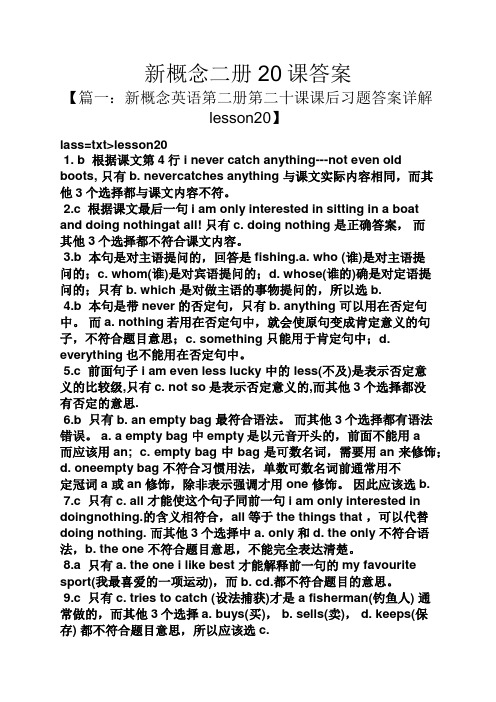
新概念二册20课答案【篇一:新概念英语第二册第二十课课后习题答案详解lesson20】lass=txt>lesson201. b 根据课文第4行 i never catch anything---not even old boots, 只有b. nevercatches anything 与课文实际内容相同,而其他3个选择都与课文内容不符。
2.c 根据课文最后一句i am only interested in sitting in a boat and doing nothingat all! 只有c. doing nothing 是正确答案,而其他3个选择都不符合课文内容。
3.b 本句是对主语提问的,回答是fishing.a. who (谁)是对主语提问的;c. whom(谁)是对宾语提问的;d. whose(谁的)确是对定语提问的;只有b. which 是对做主语的事物提问的,所以选b.4.b 本句是带never的否定句,只有b. anything 可以用在否定句中。
而a. nothing若用在否定句中,就会使原句变成肯定意义的句子,不符合题目意思;c. something 只能用于肯定句中;d. everything也不能用在否定句中。
5.c 前面句子 i am even less lucky 中的 less(不及)是表示否定意义的比较级,只有c. not so是表示否定意义的,而其他3个选择都没有否定的意思.6.b 只有b. an empty bag 最符合语法。
而其他3个选择都有语法错误。
a. a empty bag 中empty是以元音开头的,前面不能用a而应该用an; c. empty bag 中 bag 是可数名词,需要用an 来修饰;d. oneempty bag 不符合习惯用法,单数可数名词前通常用不定冠词a 或an 修饰,除非表示强调才用one 修饰。
因此应该选b.7.c 只有c. all 才能使这个句子同前一句i am only interested in doingnothing.的含义相符合,all等于the things that ,可以代替doing nothing. 而其他3个选择中a. only 和d. the only 不符合语法,b. the one 不符合题目意思,不能完全表达清楚。
新概念2-Lesson20 讲义

新概念2学案第20讲一、重要知识点1. I often fish for hours without catching anything.➢fish 的用法①①①①小试牛刀Look! A few __________ are swimming in the fish tank. ________is my favourite food. In the ocean(海洋),there are different ___________.➢without的用法例题精讲I can’t repair the car __________________. 没有你的帮助我无法修理这车。
Fish cannot live _________________. 没有水鱼活不了。
They tried to leave the restaurant _________________.他们企图不付账就离开餐馆。
He went out _________________.他一句话也没说就走了。
拓展延伸Most animals will die soon if they lose the head. But a cockroach (蟑螂) can live for nine or ten days when they have no head.同义句:They can live for nine or ten days _________________the head. (2016 秦外)➢catch小试牛刀①I jumped up to _______________(接球)and fell over.①The police have __________________(逮住那个小偷).①Where did you_________________(抓鱼)?①You’ve_______________(找我)at a bad time.①Haven’t you______________(赶上火车)?①The more stress you are under, the more likely you are to _______________ (患感冒).①Notre Dame de Paris _______________________(着火) in April, 2019.①Ben, hurry up! We need to _____________________(赶上) them, or we will lose our way in the forest.2.But this does not worry me.➢worry例题精讲①We are _____________(worry)about his illness.①The ______________(worry)news spread(传播) wide soon.同义句:His illness makes us worried.= _____________________________翻译:当有事情困扰我时,我就会去找她。
2020-2021学年新概念英语第二册 Lesson20 同步习题(含答案)
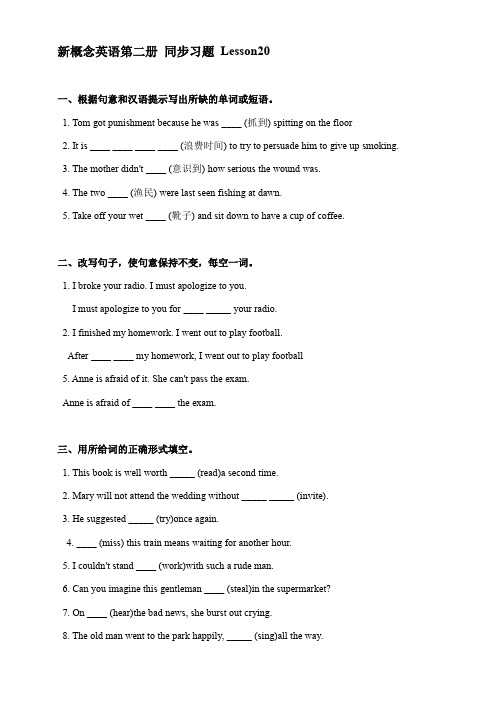
新概念英语第二册同步习题Lesson20一、根据句意和汉语提示写出所缺的单词或短语。
1. Tom got punishment because he was ____ (抓到) spitting on the floor2. It is ____ ____ ____ ____ (浪费时间) to try to persuade him to give up smoking.3. The mother didn't ____ (意识到) how serious the wound was.4. The two ____ (渔民) were last seen fishing at dawn.5. Take off your wet ____ (靴子) and sit down to have a cup of coffee.二、改写句子,使句意保持不变,每空一词。
1. I broke your radio. I must apologize to you.I must apologize to you for ____ _____ your radio.2. I finished my homework. I went out to play football.After ____ ____ my homework, I went out to play football5. Anne is afraid of it. She can't pass the exam.Anne is afraid of ____ ____ the exam.三、用所给词的正确形式填空。
1. This book is well worth _____ (read)a second time.2. Mary will not attend the wedding without _____ _____ (invite).3. He suggested _____ (try)once again.4. ____ (miss) this train means waiting for another hour.5. I couldn't stand ____ (work)with such a rude man.6. Can you imagine this gentleman ____ (steal)in the supermarket?7. On ____ (hear)the bad news, she burst out crying.8. The old man went to the park happily, _____ (sing)all the way.9. The taxi driver is kept _____ (wait) at the gate.10. Have you finished _____ (clean)these windows ?四、从A、B、C、D四个选项中选择能够填入空白处的正确选项。
新概念英语第二册 Lesson 20

fish hook 钩
fishing line
fishing net 网
【New words and expressions】 catch fisherman boot waste realize v. 抓到 n. 钓鱼人,渔民 n. 靴子 n. 浪费 v. 意识到
★catch v. 抓到(caught; caught) ① vt. 捉住,逮住,捕获 catch fish, catch thief The police have caught the thief. ② vt. 抓住,握住 Can you catch the ball? ③ vt. 及时赶到,赶上 catch the bus:赶车 ----- miss the bus 错过车 ④ catch的一些固定用法 catch a cold:染上感冒---have a cold catch fire:着火(动作)---be on fire(状态) catch one’s attentionh 摒住呼吸 catch sight(看见) of = see : 看见
★fisherman n. 钓鱼人, 渔民 fish→ fisherman [注]不要忘了er哦 1)fish 鱼 (pl.) 单复数同形 They caught many fish that morning. 2)fishes 不同种类的鱼 He studies the fishes in the Indian Ocean drink like a fish 牛饮 like a fish out of water 如鱼离水 fries fish fresh fish salted fish 3)fish v. 钓鱼 go fishing/swimming/shopping fishing in troubled water 浑水摸鱼
新概念英语第二册第20课完整ppt课件

精选ppt
Lesson20 One man in a boat
• Fishing is my favourite sport.
• fish + ing = fishing • v. + ing = 动名词 (做主语) • I often fish for hours without catching
anything. • fish (v.) 钓鱼 • for + 一段时间 • without (prep.)没有 • He left without telling me. • catching 动名词做精宾选pp语t
• But this does not worry me.
• worry (v.) 使…担心
精选ppt
• ☺ 懂得,理解 = understand • catch the sentence
• ☺catch up with sb. • 赶上… • catch one’s atth fire • 着火
精选ppt
• 2. fish ☺(c. n.) 鱼
and doing nothing at all ! • only 只是 • = just • not at all
精选ppt
• Fishing is my favourite sport. I often fish for hours without catching anything. But this does not worry me. Some fishermen are unlucky. Instead of catching fish, they catch old boots and rubbish. I am even less lucky. I never catch anything-not even old boots.
新概念英语第二册Lesson 20

• catch v. 抓住 •fisherman n. 钓鱼人 •boot n.靴子 •waste n.浪费 • realize v. 意识到
New Words
catch v. (catch-caught-caught)
1)抓住, 捕捉 Our cat caught a mouse. 我们的猫抓了一只老鼠。 2) 赶上 We've just caught the train. 我们正好赶上了火车 3) 领会 I don't catch your meaning. 我不明白你的意思。
9.I'm not really interested in fishing.
• be interested in... 对...感兴趣, 主语多为人 • interesting 有趣的,主语多为物
我对踢足球不是很感兴趣。 _I _a_m__n_o_t_in_t_e_r_e_st_e_d_i_n_p_l_a_y_in_g__fo_o_t_b_all. 这部电影真有趣。 _T_h_e_m__o_v_ie__is_i_n_te_r_e_s_ti_n_g_. _________
realize v. 意识到 • vt. 意识到 He could not realize his own danger. 他未能意识到自己的危险。 I didn't realize your sadness. 我没有意识到/察觉到你的悲伤。
• vt. 实现 = e true My dreams have been realized. 我的愿望实现了。 = I have made my dream come true.
3.But this does not worry me.
• worry ①worry sb /oneself 使某人担心 ②worry about / over sth/sb. 担心某人/某事 He always worries his partents. 他总是使他父母担心。 She's always worrying about her weight. 她总是担心自己的体重。 Don't worry. Take it easy. 别担心,放松点
逐句精讲新概念英语第二册第20课 独坐孤舟
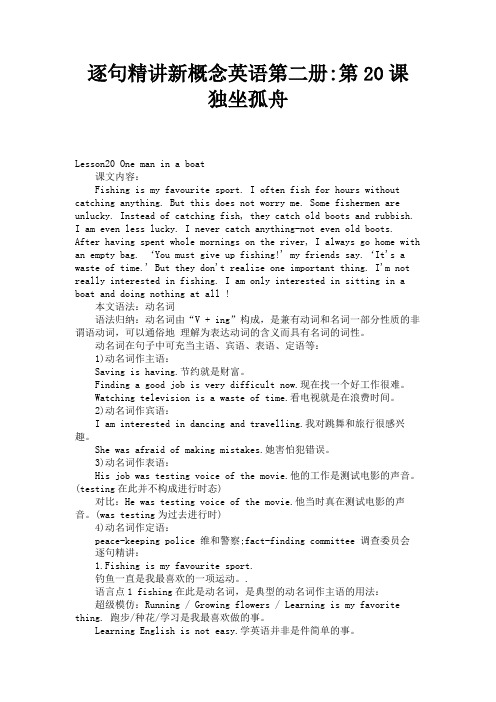
逐句精讲新概念英语第二册:第20课独坐孤舟Lesson20 One man in a boat课文内容:Fishing is my favourite sport. I often fish for hours without catching anything. But this does not worry me. Some fishermen are unlucky. Instead of catching fish, they catch old boots and rubbish.I am even less lucky. I never catch anything-not even old boots.After having spent whole mornings on the river, I always go home with an empty bag. ‘You must give up fishing!' my friends say.‘It's a waste of time.' But they don't realize one important thing. I'm not really interested in fishing. I am only interested in sitting in a boat and doing nothing at all !本文语法:动名词语法归纳:动名词由“V + ing”构成,是兼有动词和名词一部分性质的非谓语动词,可以通俗地理解为表达动词的含义而具有名词的词性。
动名词在句子中可充当主语、宾语、表语、定语等:1)动名词作主语:Saving is having.节约就是财富。
Finding a good job is very difficult now.现在找一个好工作很难。
新概念英语第二册20课 One man in a boat

instead of doing...they did...没 有做...而是做...
• instead of going to the cinema, he stayed at home.
• go shopping/go to the park. • read a book/read a magazine. • go to school/go fishing • have dinner at home/go to the
Lesson 20
One man in a boat
What i Watching TV? / playing vidio games? /going shopping? /reading books?
How do you think of fishing? Are you interested in it ?
realize 和understand
• realize: become aware, sometimes suddenly
• (通过感官或是意识作用的) • understand: 懂,理解 (通过一定的解
释,思考,学习了一定的知识后或是有 过同样的经历,感觉而知道) • I realized he was mad. • He didn't realize that he had made a mistake. • 他没有意识到自己犯了个错误
waste
• v. 浪费 • We should not waste time. • n. 浪费 • It's only a waste of time to speak to
her. • 和她说话纯粹是浪费时间。 • a waste of… 浪费…… • It is a waste of
新概念英语第二册学生用书Lesson20

3 Aftef having spent whole mornings on the river,在河上呆了整整一个上午之后。由 于作介词after的宾语的动名词所表示的动作发生在谓语动词go之前,因此,动名词要用完成 ce02s20.htm
2013-1-17
Watching television is my favourite pastime. 看电视是我最喜爱的业馀爱好。 Reading in bed is something I always enjoy. 我总喜欢躺在床上看书 b 动名词作宾语 I am very keen on cycling. 我非常喜欢骑自行车。 She is afraid of staying in that house alone. 她害怕单独住在那间屋子里。 He is capable of doing anything. 他能胜任任何事情。
Summary writing 摘要写作
Answer these questions in not more than 50 words. 回答下列问题,将答案组成一个段落,不要超过50个单词。 1 What is the writer's favourite sport? 2 What do some unlucky fishermen catch? 3 Is the writer as lucky as they are, or is he not so lucky? 4 Does he ever catch anything? 5 Is he really interested in fishing? 6 What is the only thing that interests him?
- 1、下载文档前请自行甄别文档内容的完整性,平台不提供额外的编辑、内容补充、找答案等附加服务。
- 2、"仅部分预览"的文档,不可在线预览部分如存在完整性等问题,可反馈申请退款(可完整预览的文档不适用该条件!)。
- 3、如文档侵犯您的权益,请联系客服反馈,我们会尽快为您处理(人工客服工作时间:9:00-18:30)。
• → be caught
• She might be caught in a snowstorm somewhere.
• → catch up with • e.g.: You should work harder to catch
up with the other students. • → catch hold of • e.g.:Catch hold of this rope,and we'll
C.-ing 分词分句可在句中作状语,表示多种意义.
1. 时间状语: Climbing to the tower, we saw a magnificent
view. While flying over the channel, he saw a ship
sinking.
2. 原因状语:
Being a hard-working young man, he is praised by all his fellow workers.
realize one's hope/dream/plan e.g.: At last he realized his dream of
becoming a pilot →His dream was realized at last.
Notes on the text
Fishing is my favourite sport.
important more important the most important
I'm not really interested in fishing. I am only interested in sitting in a boat and doing nothing at all!
Fishing rod
Lesson 20 One man in a boat
Answer the questions:
1.What is the writer’s favourite sport? 2.What do some unlucky fishermen catch? 3.What is the only thing that interests him?
★ boot n. 靴子
a pair of boots running shoes tennis shoes leather shoes 皮鞋 sandles 凉鞋 sneakers 轻便运动鞋 slipper 拖鞋
waste 1) vt.
You are wasting time.
Don’t waste your time and energy on the online game. 2) n. a waste of 对…的浪费
be intersted in sth. / doing sth. 对……感兴趣
be interested in 对..感兴趣 ...is interesting ....令人感兴趣的.
be excited about 对..感到兴奋 ... is exciting .... 令人感到兴奋的..
【Key structures】关键句型
1.I am very keen on cycling. 2.She is afraid of staying in that house alone. 她害怕单独住在那间屋子里. 3.He is capable of doing anything. 他能胜任任何事情.
e.g.:
1.He sat there. He did not say anything. 他坐在那儿, 他什么话也不说.
2.I must apologize. I interrupted you. 我得表示道歉. 我打断了你的说话(工作).
• I must apologize for interrupting you. 由于打断了你的说话(工作), 我得表示道歉.
• Or: I must apologize for having interrupted you.
Having worked hard a eight o’clock.
3.条件状语
You will make yourself more tired, keeping on your feet(=if you keep on your feet).
在这个区建造摩天大楼是浪费金钱。
It is a waste of money building the skyscraper in this district.
★ realize v. 意识到
real adj.真的 → realize v.意识到→reality n.现实 1)意识到 (不用于被动/进行时态,人做主语。) e.g.: Realize one's mistake e.g.: He realized that he was lying. 2) vt.实现(计划等)(主动,被动)
6. 伴随状语
• He ran up to her, breathing heavily.
• The old man was fast asleep, holding a book in his hand.
Fish begins to stink at the head. 上梁不正下梁歪,鱼要腐烂头先坏。 Never offer to teach fish to swim. 别班门弄斧
• After having spent whole mornings on the river, I always go home with an empty bag.
• spend+时间+在某地 在某地度过……时间 • after <conj.>+从句 在……之后 • 他看了一下手表之后,宣布航空表演开始。 • After having looked at his watch, he
It is a means of relaxation. He enjoys the peace of mind.
New words and expressions
• catch
v. 抓到
fisherman n. 钓鱼人, 渔民
boot
n. 靴子
waste n. 浪费
realize v. 意识到
• a 动名词作主语
1.Eating is always a pleasure. 2.Watching television is my favourite pastime. 3. 我总喜欢躺在床上看书
Reading in bed is something I always enjoy.
• b 动名词作宾语
New words and expressions
★ catch v. 抓到 (caught;caught)
The early bird catches the worm.
catch fish/ a thief catch a cold---have a cold catch the bus-----miss the bus catch one’s attention/ eyes catch fire (action)
favourite adj. 最喜欢的 无比较级,最高级 Red and Black is my favourite book. n. 心爱的人(物) ,最喜爱的东西 That song is one of his favourites. She is her aunt’s favourite
• But this does not worry me. • ★worry • ① v. 使烦恼,使担扰 • worry sb. 某人为……烦恼, • e.g.: The house worried me. / My
4. 让步状语: Knowing all this, they still insisted on
my paying for the damage.
Many boys, having had few advantages in their youth, have nevertheless done great things for their country.
announced the aerobatic show began.
• You must give up fishing!' my friends say.It's a waste of time. But they don't realize one important thing.
realize= notice= be aware of
He sat there without saying anything. 他默默无语地 坐在那里.
2.He turned off the radio. He left the room. 他关掉了 收音机, 他离开了房间.
Before leaving the room, he turned off the radio. 离开房间之前, 他关掉了收音机.
5. 结果状语 He spread a rumor that the president
was going to resign, leading to a great confusion in that country.
It rained heavily, causing severe flooding in that area.
而做成了另外一件事 • 副词instead“作为替代,反而”,单独使用时一般出现在句尾
• If you don’t want a holiday in England, why don’t you go to Syria instead?
